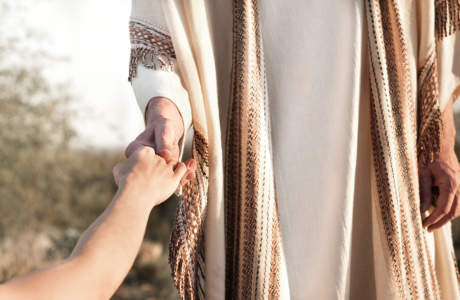John 14:6 is a well-known verse that is often quoted in isolation as proof of the exclusivity of the Christian faith: that Jesus is the only way to God the Father. Jesus tells his disciples, “I am the way and the truth and the life. No one comes to the Father except through me.” But is Jesus declaring the uniqueness of the religion that will one day bear his name, or does he have something else in mind?
Context
Canadian evangelical theologian Dr. Don Carson wrote, “A text without a context is a pretext for a proof text.” We do the Scriptures and the Christian faith a great disservice when we select a verse from the Bible and make it say what we desire without considering its context within the larger narrative.
Let’s explore the context of John 14:6. Approximately half of John’s Gospel concentrates on the last week of Jesus’ life. The events progress quickly, and John shares details that no other gospel writer includes, such as the raising of Lazarus and the ensuing plot to kill Jesus due to the religious leaders’ envy of his popularity.
In John 13, the disciples come together for the Passover meal. Jesus washes their feet and predicts Judas’ betrayal and Peter’s denial. What Jesus says in John 14 also takes place while they are seated around the table for the Passover meal, giving us a rich context to understand his words.
Famous Last Words
Jesus will be arrested later that night; therefore, his words in these chapters are commonly known as the Farewell Discourse, which includes Jesus’ final words before his death. If you know you’re about to die, you don’t waste time or words. You get straight to the point and express what weighs heavily on your heart.
In John 14, Jesus consoled his disciples because he had informed them that he would be betrayed, denied, and would leave them. He told them, “I will be with you only a little longer. You will look for me, and just as I told the Jews, so I tell you now: Where I am going, you cannot come.”
Reassurance
Jesus’ disciples were in a state of sorrow and needed consoling, as this was not the ending they anticipated. They had hoped for a Messiah who would overthrow Rome and re-establish Israel and God’s Kingdom. A suffering Saviour was not what they envisioned. Therefore, Jesus’ words at the start of John 14 are intended to reassure the disciples, offering them comfort and a sense of security:
“Do not let your hearts be troubled. You believe in God; believe also in me. My Father’s house has many rooms; if that were not so, would I have told you that I am going there to prepare a place for you? And if I go and prepare a place for you, I will come back and take you to be with me that you also may be where I am. You know the way to the place where I am going.”
Oh, Thomas!
Thomas hears Jesus and disagrees with him: “Lord, we don’t know where you are going, so how can we know the way?” Jesus answered, “I am the way and the truth and the life. No one comes to the Father except through me.”
The following verses (7-11) are a bit tricky to grasp, but to summarise, Jesus teaches that one way to understand what God is like is by looking at him (Jesus). The Jewish Annotated New Testament states, “To know Jesus and his works is to understand and know God.” In that sense, Jesus is the way, the truth, and the life. The first followers of Jesus called themselves The Way.
Exclusiveness
John 14:6 is often regarded as the basis for the exclusive claims of Christian salvation. In other words, many Christians believe and preach that people cannot know God unless they accept Jesus, as suggested by John 14:6. Is this true, and does John imply this in the verse?
I appreciate the explanation given by The New Interpreters Study Bible (p. 1937), which offers extensive notes from ninety leading theologians:
“John 14:6 expresses the central theological conviction of the Gospel of John: Jesus is the tangible presence of God in the world (1:1-18). The language of Father and Son points to the intimacy of the relationship between God and Jesus. Humanity’s encounter with Jesus the Son makes possible a new experience of God as Father (see 1:12; 20:17). Yet John 14:6 is often interpreted in ways that misuse its central theological claim. What John intends as particularism, many contemporary Christians wrongly interpret as exclusiveness. John 14:6 celebrates how Jesus reveals God for those in this particular faith community and is not a statement about the relative worth of the world’s religions. John is concerned with helping Christians recognise and name their God and the distinctiveness of their identity as a people of faith.”
If this is true, John 14:6 is not a statement of exclusiveness but rather a statement of truth that applies to anyone who follows Jesus. When we follow Jesus, we discover in Him a revelation and experience of God as Father.
Jesus’ intent in his words recorded in John 14 is to console his disciples. It would hardly have been appropriate to turn this time of sadness into a declaration of, “Oh, by the way, from now on, the religion I’m starting is the only right one. All the others are wrong. Anyway, don’t be sad!”
Other Ways
The Scriptures reveal various ways for us to know God. For instance, in his letter to the Romans, Paul writes about knowing God through His creation and human conscience. This exploration of alternative ways to understand God encourages us to be open-minded and inclusive, acknowledging that people who have never heard of Jesus can come to realise that God is real and reach out to Him.
The apostle Paul conveyed this to the people of Athens: “God Himself gives everyone life, breath, and everything else. From one man, he made all the nations…God did this so that they would seek Him and perhaps reach out for Him and find Him, though He is not far from any one of us. ‘For in him we live and move and have our being.’ As some of your own poets have said, ‘We are his offspring.’
Summary
To summarise, I don’t believe Jesus intended to make a statement of exclusiveness in John 14:6. However, another verse appears rather firm, which is part of Peter’s sermon in Acts 4:12: “Salvation is found in no one else, for there is no other name under heaven given to mankind by which we must be saved.”
In John 14:6, Jesus comforts his followers, assuring them that although he will die, it is not the end of the story. While they can’t follow him now, they eventually will. Jesus’ death and resurrection paved the way for anyone who trusts him to follow through death and be resurrected in the Father’s presence. If you’re seeking a relationship with your creator, I encourage you to pray to Jesus and accept Him as your Saviour.
If you’re keen to explore this topic further, I encourage you to listen to the following episodes of the Digging Deeper Podcast:
#32 People who never hear about Jesus





